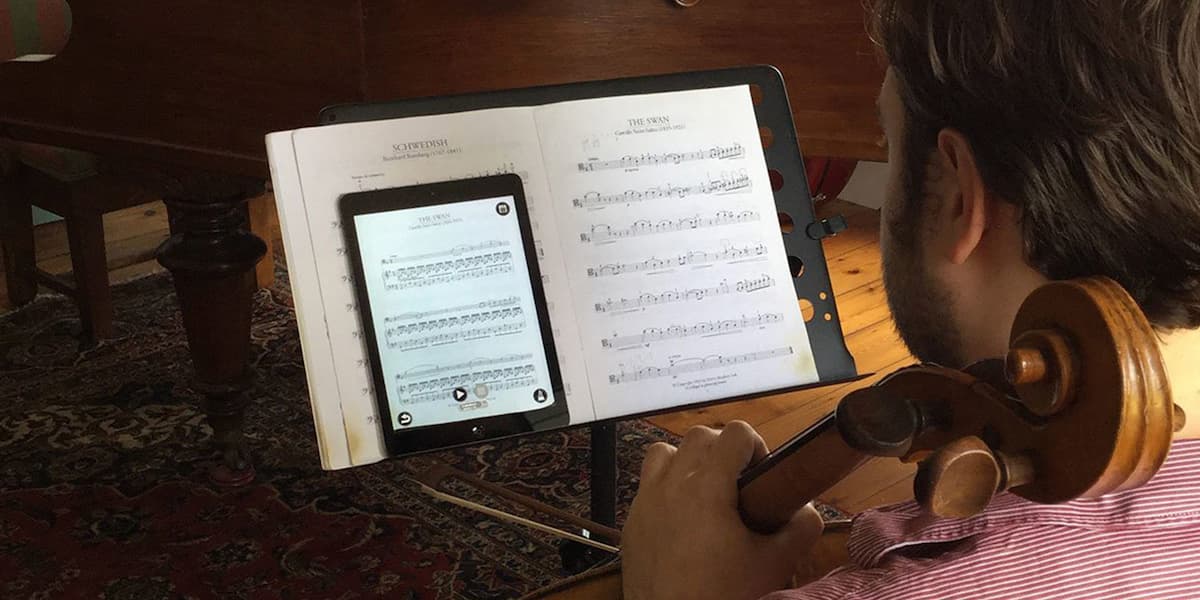I’m often asked to turn the pages for pianists at my local music society, but I tend to decline because the responsibility of page-turning is one which should not be taken lightly. An ability to read music well does not automatically qualify one for the role, and many people do not realise that page-turning is an art in itself, a specialist skill which can help a performance go brilliantly, or turn a concert into a Feydeau farce. A pianist colleague of mine, for whom I turned at one of his concerts earlier this year, calls it “the worst job in the world”.

© i.ytimg.com
These days at piano concerts it is still quite unusual to see a page-turner in attendance. The ongoing custom/burden of having to perform from memory (a habit which developed during the second half of the nineteenth-century, thanks in no small part to Franz Liszt and Clara Schumann) means that the turner is still a fairly rare sight. It is more common if the pianist is playing as part of a chamber ensemble, but even here some pianists will memorise the piano part to avoid having the turner with them: some pianists simply don’t feel comfortable with a page-turner at their side.
Epic Fail – Turning Page during a Piano Concert
Page turning can be a nerve-wracking experience as the turner feels a great responsibility to “get it right” for the performer. Turns should be discreet and silent (turn from the left of the pianist, using the left hand to turn the top of the page): in effect the turner should be “invisible” – and the turner should be sure never to turn too early or too late. In addition, the turner has to be able to understand and act correctly upon repeats, da capo and dal segno markings, and other quirks of the score. Turners also need to be alert to concert hall conditions: drafty halls can be stressful as stray gusts and breezes may blow the pages around. Page turners have to observe correct stage etiquette: they must follow the performer on to the stage and know not to rise from their chair nor fidget during pianissimo passages. They leave the stage after the performer has taken his or her applause and only step forward to receive plaudits if invited to by the performer. Much of the turner’s role is about being able to “read” the performer’s body language and be acute enough to act upon sometimes highly discreet signals. Turners should not discuss their anxiety with the performer, nor expect the performer to give them tips or advice about their own playing or musical careers.
In fact, being able to read music is not necessarily a prerequisite of being a competent page turner as someone who gets too involved in reading the music may miss a crucial turn. Most performers will have their own page-turning horror stories (turning the wrong pages, a severely damaged score with pages held together with sellotape, pages out of order) but also anecdotes celebrating page-turning and page turners. One turner confessed that pianist Francesco Pietmontesi’s performance of the Liszt transcription of Beethoven’s ‘Pastoral’ Symphony had moved her to tears, and many people describe the privilege and pleasure of being able to turn for top international artists.
How Boris Berezovsky reacted to a page-turning error
Modern times call for modern page-turning techniques and gadgets: scores stored on an iPad or other tablet device can be turned using a bluetooth foot pedal such as the AirTurn. I have one of these devices but I must admit I don’t trust it: press the pedal too harshly and two pages will turn at once. And then there is the additional anxiety of how to cope with the piano pedals while using the device…..

© TapSmart
Music publishers tend to print music in such a way as to facilitate easy page turns, but when this is not possible, one either ends up with photocopied sheets taped to the score, uses an automatic turner, or opts to have a page-turner, which can look more poised and professional. Whatever route you choose, make sure your page turns are tidy, quiet and discreet – oh, and always thank your page-turner after the performance!
For more of the best in classical music, sign up for our E-Newsletter





1 way I found useful to help the turner, is tell them to watch for my nod, instead of reading the music so much.
Good plan!
One good turn deserves another!
Great article! I could relate a lot.
“Airturn pedal, I have one of these devices but I must admit I don’t trust it: press the pedal too harshly and two pages will turn at once”
I’d recommend you giving the Coda Stomp Bluetooth pedal a try, I find it to be the most reliable for live performances, besides being the sturdiest.
Lucy=turner
Charlie Brown=pianist
Football=written music
When I was in High School (before learning how to read music), I was pulled on stage at the last minute to page turn for the pianist. I turned one page too soon, and we had a disaster! The pianist was angry, until I informed her that I didn’t know how to read music well enough to do the job. Make sure the page-turner knows how to read music!